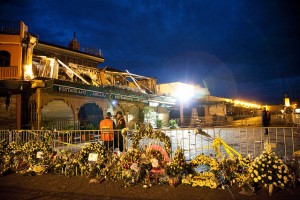It was the biggest terrorist attack on Moroccan soil since 12 suicide bombers killed 33 people in distinct locations in Casablanca eight years ago. Since the carnage on April 28, Moroccan police have arrested three men, and according to the information so far released by the Interior Ministry, the main suspect, believed to be a Moroccan man in his twenties, had planned to experience jihadist combat abroad in places such as Chechnya and Iraq, before turning his attention to a home-made bomb which he apparently took six months to construct.

The location of the café made it certain that most of the victims would be Westerners, as was the case. But was this just a desire to spill Europeans’ blood on the part of an Al Qaeda admirer – as the suspect is depicted according to the information seeping out thus far – or was it a more strategic targeting of the country’s tourism industry? Or a message to the government that Western values had corrupted this Islamic nation? Or even a challenge to the democratic reform process under King Mohammed VI, recently given fresh impetus by protests mimicking those of Tunisia and Egypt? Was it an attempt to draw the authorities into a fresh crackdown on opposition voices, the bombing occurring just days after the release of a large number of political prisoners, most of whom were Islamists?
Or could the spectre of Islamist terrorism drive the regime of King Mohammed VI and the pro-democracy protesters into each other’s arms just when the key period of public debate over promised constitutional reform is due to start in earnest?
The initial response from government representatives was encouraging, sternly announcing that the democratisation drive goes on. This was how Rabat wished to portray the attack, then; a desperate attempt by a Bin Laden acolyte to prevent greater freedom and openness in what is already one of the most liberal nations in the Muslim world. Three days after the Argana atrocity, trade unions joined forces on the streets with the youth protesters who are demanding the dissolution of parliament and new elections before the drawing up of a new constitution (the king has commissioned a group of experts to rewrite the country’s fundamental laws).
The elephant in the room, however, in Morocco is the non-violent Islamist tendency. The moderate PJD is already the largest opposition party in parliament, but many observers maintain that the outlawed Justice and Spirituality party, headed by the mysterious Sheikh Abdessalam Yassine (under permanent house arrest), would command overwhelming support if it were legalized. For its part, the group refuses to recognise the king’s role as “commander of the faithful.” So how free will Morocco’s next elections be allowed to be? There may be one compromise that both the young protesters and the regime will have to agree on: the king stays in and the bearded sheikh is kept out.
Leave a Reply
You must be logged in to post a comment.